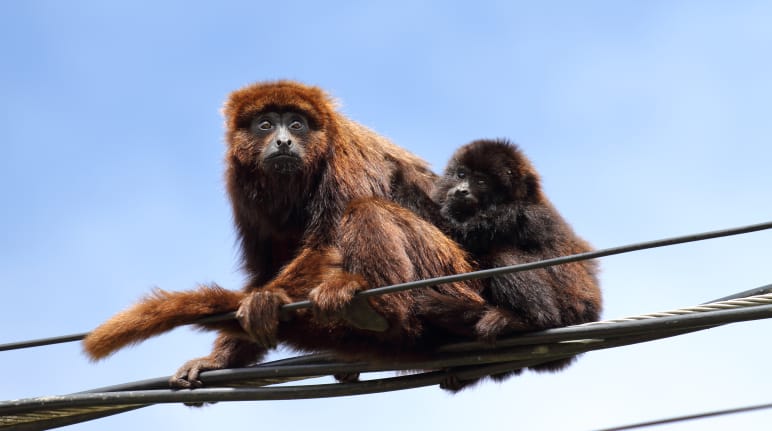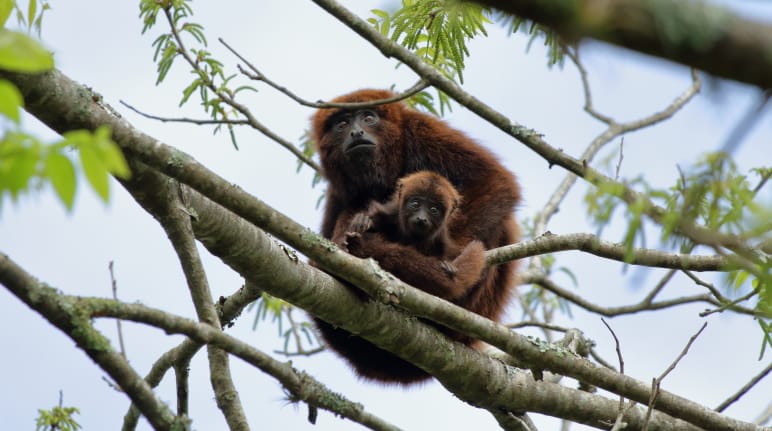Brazil: Howler monkeys need protection from deadly electric shocks!
Howler monkeys living in southern Brazil are threatened with extinction because their rainforest habitat is being cut down and fragmented. In the Porto Alegre area, dozens of the primates are being killed or seriously injured by electric shocks because grid operators are not properly securing and insulating their power lines and pylons.
Call to actionTo: To the electricity companies and grid operators in Porto Alegre, Brazil
“Power companies in Porto Alegre, Brazil, must secure their power lines and pylons so they do not pose a deadly danger to howler monkeys.”
Southern brown howler monkeys (Alouatta guariba clamitans) are perfectly adapted to life in the trees. They feed on leaves, flowers and fruit, and rarely come down to the ground, where they are vulnerable to predators.
As their habitat – the rainforest of southern Brazil – continues to shrink due to deforestation and is fragmented by agriculture, settlements and roads, these primates are often forced to use power lines as paths to cross treeless areas.
In the southern part of Porto Alegre, the monkeys face a deadly threat: Because the power lines are in poor condition or too close to trees, howler monkeys are killed or severely burned by electric shocks. Veterinarians often have no choice but to amputate the charred limbs of surviving animals. After weeks of veterinary care, they can only be re-homed in zoos.
For 30 years, two universities in Rio Grande do Sul have been studying howler monkeys, which are classed as “vulnerable” by the IUCN, that live in the remaining forest areas of Porto Alegre. A study from 2018 to 2024 recorded 74 electrocutions in the region. There is likely to be a significant under-reporting, as many killed or severely injured animals are not found and are taken by predators.
The power company, CEEE-Equatorial, claims to take animal welfare very seriously, but has apparently failed to take effective action for years. In February, the local environmental prosecutor filed a civil lawsuit against two power companies. They are demanding that the damage caused by the deaths of these primates be repaired and that electrocutions be prevented.
Please sign our petition to the power companies and grid operators in Porto Alegre, Brazil.
Start of petition: 10/09/2024
BackgroundPower lines are a major threat to many animal species around the world. Every year, millions of animals, including many birds, are fatally electrocuted by poorly constructed power lines and pylons.
When an animal touches two wires of an overhead power line carrying different voltages, a short circuit can occur. This causes an electric current to flow through the animal's body, often resulting in death from severe burns and paralysis.
Animals can also make a connection between a power line and a grounded power pylon, causing a ground fault. There is also risk of arcing at short distances and in humid air.
Furthermore, if tree branches come into contact with live wires due to poor pruning, animals in the tree can be electrocuted. Poorly insulated power connectors near power pylons are also a danger to wildlife.
More information in Portuguese:
- Página do Instagram da Sociedade Brasileira de Primatologia
To: To the electricity companies and grid operators in Porto Alegre, Brazil
Ladies and Gentlemen,
According to the Urban Primate Program of the Federal University of Rio Grande do Sul (UFRGS) and the Primatology Laboratory of the Catholic University of Rio Grande do Sul, howler monkeys in the southern part of Porto Alegre suffer fatal electric shocks or horrible mutilations due to inadequately insulated power lines and pylons. Trees with branches that reach power liines and are not pruned are also a danger.
Despite being aware of this problem, your companies do not appear to have taken effective measures to protect animals from electrocution. On the contrary, according to the Urban Primate Program, the number of howler monkeys killed or injured in this way has actually increased.
In February, the Environmental Prosecutor's Office of Porto Alegre filed an urgent public civil lawsuit against your companies. The Environmental Prosecutor's Office is demanding that the damage to wildlife be repaired and further cases of electrocution be prevented.
We therefore urge you to take immediate action to protect the howler monkeys from this danger. In consultation with primate protection experts, please quickly implement effective measures to protect these animals from electrocution.
Yours faithfully,
two universities in Rio Grande do SulThe Urban Primate Program of the Federal University of Rio Grande do Sul (UFRGS) and the Primatology Laboratory of the Catholic University of Rio Grande do Sul
classed as “vulnerable” by the IUCNIUCN Redlist, 2024. Southern Brown Howler Monkey. Alouatta guariba ssp. Clamitans: https://www.iucnredlist.org/species/39918/190419216
civil lawsuitESTADO DO RIO GRANDE DO SUL, MINISTÉRIO PÚBLICO, PROCURADORIA-GERAL DE JUSTIÇA, PROMOTORIA DE JUSTIÇA DE DEFESA DO MEIO AMBIENTE, 2024. COM PEDIDO DE TUTELA ANTECIPADA. Distribuição preferencial ao Projeto Ambiental - Edital 01/2024 – COMAG https://oeco.org.br/wp-content/uploads/2024/02/ACP-PREVENCAO-MORTE-BUGIOS-CEEE-EQUATORIAL_240216_181910.pdf
two power companiesCOMPANHIA ESTADUAL DE DISTRIBUIÇÃO DE ENERGIA ELÉTRICA – CEEE-D and EQUATORIAL ENERGIA, holding controladora da CEEE Equatorial
This petition is also available in the following languages:
Help us reach 100,000:












